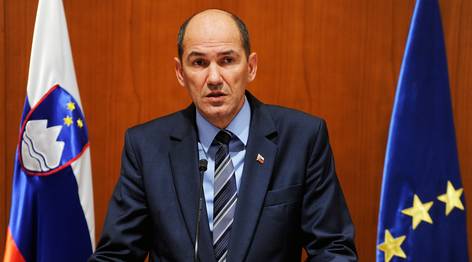NEWS
Slovenian Prime Minister Janez Janša: "Currently, there is insufficient support to resolve the crisis in Slovenia"
"After lengthy discussions, it has become clear that there is currently no two-thirds majority consensus on amending the Slovenian Constitution and on incorporating the golden fiscal rule into the Constitution, which means that further steps and procedures considered urgent owing to objective circumstances cannot be predicted and, therefore, the big question is when Slovenia will be able to take these steps and carry out the procedures," the Prime Minister explained after today's meeting with the presidents and group leaders of the Slovenian parliamentary parties. He recalled that the National Assembly last week ratified the Treaty on Stability without a single opposing vote, which envisages the golden fiscal rule being incorporated in the documents in force at the national, constitutional and similar levels. He also explained that the time limit set by the Treaty is slightly longer; however, in those EU Member States who have introduced the golden fiscal rule into their national documents this measure has already borne fruit.
In the Prime Minister's view, the opposition parties are also not amenable to cooperating in the partnership proposed by the Coalition Government for exiting the crisis. "Some polite words were exchanged and the Coalition expressed its willingness to cooperate on a case-by-case basis, but later, when specific steps needed to be defined, there was no agreement for cooperation in seeking solutions for Slovenia to overcome the crisis," emphasised the Prime Minister. In his opinion, it is more or less clear that, after today's meeting, the Coalition Government is alone in its search for solutions.
The Prime Minister also pointed out that every day that passes without an operational budget is costly for the state, and that for every day that passes without incorporating the golden fiscal rule in the Constitution, Slovenia needs to pay higher interest rates on its loans, which means the possibilities for the additional state borrowing required this year and the next year are reduced and more expensive.
The Prime Minister further explained that the Government has been making every possible effort to avoid this year's financial catastrophe – at least in part – and recalled that negotiations are still underway to reach an agreement with the other social partners within the Economic and Social Council on some of the anti-crisis measures proposed within the framework of the Fiscal Balance Act. In this context, he added that it is the Government's aim to also coordinate the key steps to be taken to exit the crisis in the new Social Agreement.





